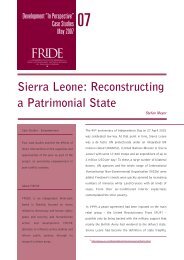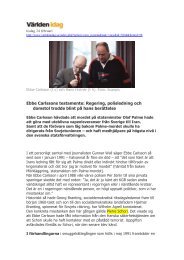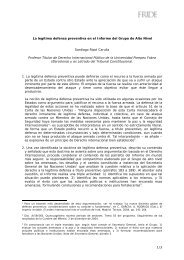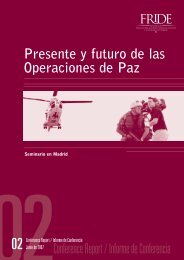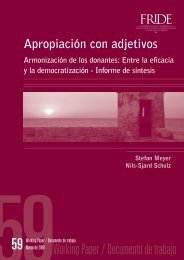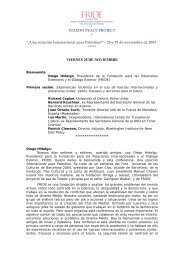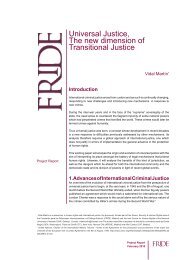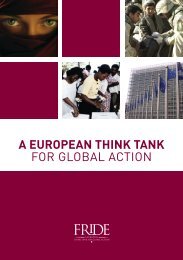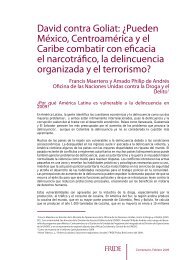Quick Fix or Quicksand? Implementing the EU Sahel Strategy - FRIDE
Quick Fix or Quicksand? Implementing the EU Sahel Strategy - FRIDE
Quick Fix or Quicksand? Implementing the EU Sahel Strategy - FRIDE
Create successful ePaper yourself
Turn your PDF publications into a flip-book with our unique Google optimized e-Paper software.
8<br />
WORKING PAPER 114<br />
contributes through <strong>the</strong> IfS) was launched in 2010 with a view to streng<strong>the</strong>ning state<br />
functions. Initiatives under <strong>the</strong> programme, including plans to construct roads, have now<br />
been suspended. 22 Its aim of providing alternative opp<strong>or</strong>tunities to n<strong>or</strong><strong>the</strong>rn youth most<br />
prone to recruitment by AQIM remains as valid as ever. Future eff<strong>or</strong>ts to re-launch <strong>the</strong><br />
programme must tap into emerging insights on <strong>the</strong> diverse positions of different act<strong>or</strong>s in<br />
<strong>the</strong> n<strong>or</strong>th. M<strong>or</strong>e targeted initiatives beyond state-led interventions are needed to streng<strong>the</strong>n<br />
groups such as youth leaders who have spoken out against violent Islamist extremism. Also,<br />
as shown by <strong>the</strong> divided reaction following <strong>the</strong> Tuareg led declaration of a Republic of<br />
Azawad in April 2012, opp<strong>or</strong>tunities do exist to identify secularists, moderates and Malian<br />
nationalists m<strong>or</strong>e amenable to <strong>the</strong> <strong>EU</strong>’s vision of progress and development.<br />
One of <strong>the</strong> <strong>EU</strong>’s ongoing actions includes supp<strong>or</strong>t f<strong>or</strong> a recently created N<strong>or</strong><strong>the</strong>rn<br />
Mali Netw<strong>or</strong>k f<strong>or</strong> Peace and Security. This brings toge<strong>the</strong>r individuals from different<br />
communities, factions and professions. The netw<strong>or</strong>k currently serves as <strong>the</strong> main point<br />
of contact f<strong>or</strong> Malian auth<strong>or</strong>ities and international partners. The latter include <strong>the</strong> Swiss<br />
Embassy in Bamako, <strong>the</strong> <strong>EU</strong> and <strong>the</strong> United Nations Development Programme.<br />
The intervention in Libya proved to be a serious humanitarian blind-spot f<strong>or</strong> <strong>the</strong> <strong>EU</strong>. By<br />
January 2012, <strong>the</strong> m<strong>or</strong>e than 200,000 Malian Tuaregs who fled chaos in Libya arrived in<br />
food-vulnerable areas of <strong>the</strong> <strong>Sahel</strong>. This exacerbated humanitarian conditions and fuelled<br />
existing communal tensions in n<strong>or</strong><strong>the</strong>rn Mali. The <strong>EU</strong> has joined international eff<strong>or</strong>ts to<br />
address <strong>the</strong> serious food crisis in <strong>the</strong> <strong>Sahel</strong> by improving <strong>the</strong> area’s long-term resilience.<br />
This presents a maj<strong>or</strong> opp<strong>or</strong>tunity f<strong>or</strong> <strong>the</strong> <strong>EU</strong> to implement programmes with a clear<br />
development-security linkage.<br />
In this respect, on 18 July <strong>the</strong> <strong>EU</strong> scaled up its assistance through <strong>the</strong> launch of <strong>the</strong> Alliance<br />
f<strong>or</strong> Resilience in <strong>the</strong> <strong>Sahel</strong> initiative. 23 Senegal, Gambia, Mauritania, Mali, Burkina<br />
Faso, Niger, Chad and Nigeria are among several international and local partners and<br />
<strong>or</strong>ganisations involved. 24 <strong>EU</strong> funding was also increased by €40 million to bring <strong>the</strong> total<br />
response to <strong>the</strong> <strong>Sahel</strong> food crisis to €337 million. Whilst obviously still in need of traction,<br />
a rejuvenated <strong>Sahel</strong> <strong>Strategy</strong> could have significant value-added in <strong>the</strong> humanitarian field<br />
where <strong>the</strong> <strong>EU</strong> has unparalleled resources and expertise.<br />
The Malian crisis now challenges <strong>the</strong> <strong>EU</strong> to move beyond its own self-image as a ‘soft power’<br />
in <strong>the</strong> region. This might require <strong>the</strong> integration of a m<strong>or</strong>e robust military dimension into<br />
<strong>the</strong> <strong>EU</strong> policy mix, not least in supp<strong>or</strong>t of a possible ECOWAS deployment. F<strong>or</strong> <strong>the</strong> time<br />
being, as noted above, <strong>the</strong> planning of a CSDP military operation tasked with re<strong>or</strong>ganising<br />
and training <strong>the</strong> Malian security f<strong>or</strong>ces is ongoing.<br />
2.3. Niger and Mauritania: <strong>the</strong> fragile ‘c<strong>or</strong>e’<br />
In Niger, a national counter-terr<strong>or</strong>ism strategy to tackle domestic insecurity and<br />
respond to crisis in <strong>the</strong> <strong>Sahel</strong> was finally implemented in October 2011. The strategy<br />
focuses on social and economic development in six of <strong>the</strong> country’s eight n<strong>or</strong><strong>the</strong>rn<br />
22. Interview with seni<strong>or</strong> <strong>EU</strong> official, 8 March 2012.<br />
23. This is also known in French as <strong>the</strong> Alliance Globale pour l’Initiative Résilience (AGIR).<br />
24. ‘<strong>Sahel</strong> food crisis – Commission scales up assistance and launches a Partnership f<strong>or</strong> Resilience in <strong>Sahel</strong>’, see http://europa.eu/rapid/pressReleases<br />
Action.do?reference=IP/12/613&type=HTML



